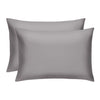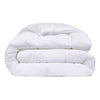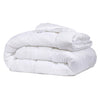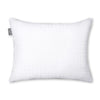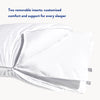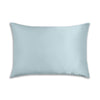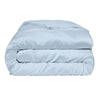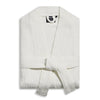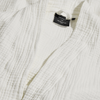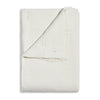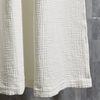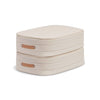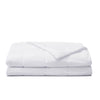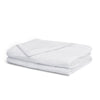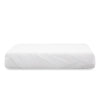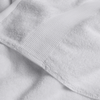The Daily Miracle
Your How-To Guide To Getting Rid of an Allergic Reaction To Laundry Detergent
Published
March 21, 2022
Author
Nicholas Crusie

Allergies are no fun to deal with, but sadly there is no magic potion you can drink to rid you of all allergies forever. Your best bet at keeping your allergies at bay is by avoiding your triggers. Anyone who has allergies most likely has a good idea of what triggers an allergic reaction.
Allergies can be tricky, especially allergies surrounding detergents and other washing soaps. It's not necessarily the soap itself or cleaning agent that triggers a reaction; sometimes, it can be one simple, solitary ingredient. Sometimes it’s a combination of factors. It's not uncommon to have a bad reaction to laundry detergent; you just have to find one that works for you.
So let’s find one that works — for you and your clothes.
Why Are You Allergic To Laundry Detergent?
Have you spent hours searching your grocery store in hopes of finding a detergent that will finally work for you but have been unsuccessful? Don't feel bad; we've all been there.
The truth is, (nowadays) there are a ton of harmful ingredients in laundry detergent, which is probably why detergent allergies are becoming so common. You'd think some that are safe to wash your beloved clothes and bedding would be safe for your skin, right?
Well, that's not really the case. Yes, for most people, any detergent will work for them, but if you have sensitive skin or are allergy-prone, chances are your results are the opposite.
Laundry detergent wasn't always so toxic. Before the 1950s, laundry detergent consisted of a few simple ingredients… just enough to get your clothes cleaned! However, times have changed.
Laundry detergent used to be made of pure soap made by saponification. Saponification is a natural process that converts animal fats and lye into soap. These are natural fats, meaning they are quite harmless to humans.
During the Vietnam War, those fats were needed more urgently elsewhere; soap was the last priority. This is where the creation of synthetic alternatives began. With this becoming an ultimately cheaper and more lucrative option, big soap companies never looked back.
Essentially, you aren't allergic to soap; you are probably allergic to one or more of the petrochemicals that are in your household soap, as they're in almost all of them. However, there is hope for you.
Just because the soap you've known and loved isn't working anymore doesn't mean it's a bad thing. Perhaps it's time for you to join the green side of things and consider an eco-friendly and natural detergent!
Caring For Your Allergic Reaction
If you're reading this too late and have already broken out in an allergic reaction, we're here to help.
Here are the best ways to soothe your detergent rash:
Signs Of a Detergent Reaction
Before you begin with a treatment method, let's be sure you do indeed have what you think you have.
- Red skin
- Skin irritation
- Severe itching
- Swelling in the affected area
- Hot skin
- Skin that is painful to touch
- Bumps
- Blisters
If you're experiencing these skin issues shortly after putting on your freshly washed clothes, you may have a detergent rash on your hands.
Tip #1: Take Off the Clothes
Considering your rash is caused by your clothes, our first suggestion is to take them off. Next, try and find a pair of clothes that aren't freshly washed. You can even use a towel or a robe in the meantime.
Tip #2: Grab Some Oatmeal
We know what you're thinking, not the time for breakfast. Or not until you finish this article.
A great way to soothe your irritated and itchy skin is by dipping in an oatmeal bath. It's a simple at-home remedy that can seriously help with pain management.
Fill your tub up with warm water, then add a cup or two of colloidal oatmeal. Stir it around, then let your body soak for 10 to 20 minutes.
Tip #3: Rinse With Cold Water
If you don't have oatmeal on hand, a cold rinse is your next option.
Get the shower and thoroughly rinse your whole body with cold water. You can use soap, too; just make sure it's fragrance-free. After all, fragrance may be the cause of your initial allergic reaction.
Tip #4: Apply Cream
Once you've washed off whatever causes your rash or outbreak, you can apply a cream or ointment to ease the pain and help speed up the process.
Be sure this cream has at least 1% hydrocortisone; this way, it can help reduce the itching.
Tip #5: Anti-Itch Lotion
Right about now, an anti-itch lotion is your best friend. Itching is a total trap because it does nothing but other momentary relief but worsens the future urge to itch exponentially.
Applying an anti-itch lotion is a great idea, this way, you stop itching and picking.
Tip #6: Rinse Clothes Twice
If you don't have time to find a new detergent before you wash your next load, then we suggest rinsing those clothes two (or three) times before wearing them.
You don't want to have another detergent rash, but walking around in stinky clothes isn't necessarily an option either.
Tip #7: Baking Soda and Vinegar
Another tip if your Miracle Made Laundry Detergent hasn't arrived in the mail yet — consider washing your clothes with baking soda and vinegar. It is a natural cleaning solution.
While it may not smell like lavender, it's still a very viable way of getting your clothes bright and clean.
Avoiding Allergic Reactions
Considering you can't cure your allergies, we think the best course of action — after you get your rash under control — is learning how to avoid future detergent reactions.
Use a Different Detergent
Everyone has their special scent, the detergent they've used for years and are somewhat attached to. But if you're familiar with the saying "when you love something, set it free," this is what they mean by that.
Even if you adore your detergent, it may be time to find a new favorite. Here at Miracle Made, we live to produce hypoallergenic products, so you don't have to spend hours searching for a company you can trust because we're right here!
The Miracle Made Laundry Detergent is eco-friendly, sensitive on the skin, and is ultra-concentrated. This means your clothes are going to come out smelling extra fresh. Plus, there are only five natural ingredients — ingredients with names that you can recognize and pronounce.
Use Hypoallergenic Products
If you're allergy-prone, this is a good time to consider using more hypoallergenic products on a day-to-day basis.
If you have allergic reactions often, then using hypoallergenic products like sheets and blankets can often have many benefits, even better sleep.
Bye, Bye Detergent Rash
A detergent rash is a pain: literally and figuratively. It can be frustrating when you can't even do something as simple as wash your clothes without having an allergic reaction. But trust us, it's not you; it's the detergent. Like most things nowadays, detergents are full of toxic ingredients that can harm your skin.
Before getting down on yourself or thinking you have to wash all your clothes by hand with baking soda, just know you have options. There are laundry detergents specially made for anyone with sensitive skin, allergy-prone skin, or people that simply want to be more eco-friendly.


